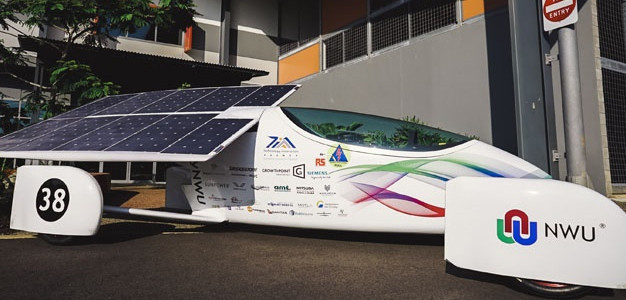
The North-West University (NWU) solar car - Naledi - is taking part in the gruelling Bridgestone World Solar Challenge in Australia from 8 to 15 October.
The Bridgestone World Solar Challenge is claimed to be the world's foremost innovation challenge, with teams from around the world vying to become the first to deliver sustainable solar-powered electric vehicles.
This year marks the event's 14th crossing of Australia and the 30-year anniversary of the challenge. The challenge aims to showcase technology that could be used for commercial purposes.
The 42 solar cars participating in the race take up to a week to travel from the northern city of Darwin to reach the southern city of Adelaide, 3 000km away, with an average speed of 90-100 kilometres per hour.
The route takes the cars through some of the driest regions on earth. The fastest time was achieved by Japan's Tokai University in 2009, completing the race in 29 hours and 49 minutes.
Belgian team Punch Powertrain started first on Sunday after recording a trial time of 2:03.8 for 2.97km, hitting an average speed of 83.4kmph.
NWU's Faculty of Engineering in August launched Naledi, the 2017 iteration of the solar car, at The Roots in Potchefstroom.
In 2016, the team from the NWU achieved the longest distance by a South African team, won the Team Professionalism and Safety Award, as well as the Spirit of Africa award. The team has already participated in the world's big solar car races. Its achievements include taking 11th place in an overall field of 29, leaving behind teams from universities such as Massachusetts Institute of Technology and Cambridge.
"The car went through several tests to see whether it complies with regulations and we had a very successful day," says professor Albert Helberg, team captain, from Darwin.
"We don't have to change the car, which is wonderful news. We only have one small mechanical change to make - the rest of the changes are mostly cosmetic. The team has been working so hard and when we heard this we all immediately relaxed. Although they are very tired at the moment, the team is doing very well."
Changes include moving some of the hazard lights on their chase and lead vehicles and a small change to one of the circuits in the battery box.
"I'm very excited; we only need to do about half a day's work to get the car through static scrutineering and then we start with dynamic scrutineering," says Helberg.
Dynamic scrutineering entails figure-eights, slalom courses, emergency stops, as well as a fast lap around the racecourse at Eden Valley in Darwin.
Naledi will travel between 500km and 600km during the first leg of the race.
According to the provisional update for day three at the race, last year's winners, Netherland's Nuon Solar Team, is continuing its domination across the Australian outback.
Travelling around 86kmph, the Dutch team has established a lead of around 40km and is now midway between Alice Springs and Kulgera.
It adds that a drama is unfolding behind them, with Team Tokai from Japan being overtaken, first by US Team Michigan in 'Novum', who have now moved into a clear second, and then minutes later, by Team Twente's 'Red Shift'. Michigan, in its torpedo-shaped solar car, has been the big mover of the day.
No updates were given on South Africa's Naledi.
Share